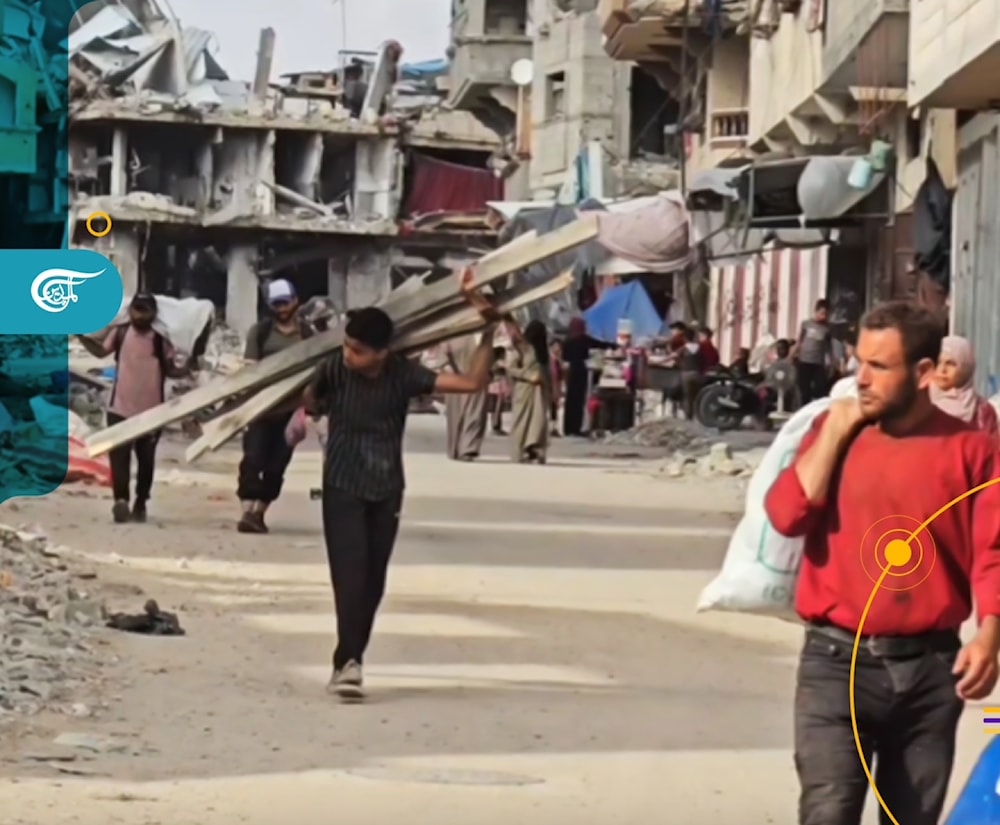Palestinians' return to Beit Lahia: Death draws no smiles
The Israeli threat for the immediate evacuation of Beit Lahia, north of Gaza, on account of it having become a dangerous fighting zone, was very much against the hopes of its people.
-

On that night, you could see it in the eyes of thousands: They were broken. (Al Mayadeen Net)
You can see it in their eyes, what it meant to leave your house, or whatever is left of it for the umpteenth time. Though they may have little left waiting for them; the remnants of a makeshift house with fabric separating its rooms and covering its ceiling, the thousands who were recently displaced from Beit Lahia would have never willingly left their homes.
The people of this “town” - they call it that because it has for years resisted being called a city - have a million different reasons to hold on to it, even at the risk of death; not because they are farmers and true sons of this land, but because the true meaning of life and its only joy lies in them living out their lives in the same place they were born.
The people of Beit Lahia, or “Lahawnah” [Lahianites], as they are known, are not refugees, despite being at the forefront of all Resistance movements witnessed by Palestine. Their relationship with their town is a marvelous amalgam of belonging and social affection. They possess an uncanny ability to make light of any adversity, and humor is said to be part of this old town’s genetic makeup.
The name “Beit Lahia” was derived from its old name “Bayt al-Lahou” [the house of entertainment]. Though the town’s more religious-minded care little about this etymology and instead present their own version explaining that the true origin of the word is “Bayt al-Ilah” [the House of God], they wrap the story around with so much whimsy that you’d go back to thinking it really does mean “the house of entertainment”.
It was only on that evening that you could see the Lahianites somewhat out of sorts. Everything for them is joking material, with the exception of the loss of someone dear or leaving one’s house and land behind. On that night, you could see it in the eyes of thousands: They were broken. For three months, the Israelis wrought death, destruction, and massacres on Beit Lahia, and the people were hoping that the enemy would “take its share of blood and move on.” But the Israeli threat for the immediate evacuation of Beit Lahia, on account of it having become a dangerous fighting zone, was much against their hopes, as they wished to spend the remainder of their lives in their city, working its fields, which they had just recently replanted.
Abou Ahmad Maarouf was one of the ones who were forced to heed the evacuation orders. “Children are precious brother, we’ve lost 15 of our family, we need to save what’s left of it,” he told Al Mayadeen Net, adding, “If it were only about me, by God I wouldn’t have left, but most of the family consists of orphans, women, and children, it’s not my place to decide for them or force them to follow my decision.” For the 50-something-year-old man, death is to be displaced in a refugee center; actually, the best end one could hope for is to die, with the last thing in sight being his house and trees.
Why Beit Lahia in particular, we asked Umm Ata, whom we met after she returned home, as she watered the roses on her balcony. “They want to displace us, knowing very well that the people that are the most difficult to uproot are farmers, we got the better of them; we didn’t just come back home, we cleaned up our lands and intend to farm them. To farm is to stay; it means that we refuse any of their schemes meant to decide our future.”
For the Lahianites as well, the town is worth far more than a house or garden. It has a certain social atmosphere the likes of which you can never find anywhere else in this world. Here is how Mohammad al-Ashkar put it, “People here love one another. A great calamity is made minuscule when your neighbors stand next to you. For example, people make sure to feed the less fortunate. If someone should pass away, all the neighbors come together to give out food in his memory for days. If someone gets married, all of Beit Lahia celebrates with him. Technology and the worries of the world, which created the diseases of selfishness and individualism, the destroyers of human societies, could not get the better of us. So, it’s only natural that the occupation would be helpless [in changing us].”

 5 Min Read
5 Min Read








